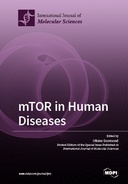Explore

The mechanistic target of rapamycin (mTOR) is a major signaling intermediary that coordinates favorable environmental conditions with cell growth. Indeed, as part of two functionally distinct protein complexes, named mTORC1 and mTORC2, mTOR regulates a variety of cellular processes, including protein, lipid, and nucleotide synthesis, as well as autophagy. Over the last two decades, major molecular advances have been made in mTOR signaling and have revealed the complexity of the events implicated in mTOR function and regulation. In parallel, the role of mTOR in diverse pathological conditions has also been identified, including in cancer, hamartoma, neurological, and metabolic diseases. Through a series of articles, this book focuses on the role played by mTOR in cellular processes, metabolism in particular, and highlights a panel of human diseases for which mTOR inhibition provides or might provide benefits. It also addresses future studies needed to further characterize the role of mTOR in selected disorders, which will help design novel therapeutic approaches. It is therefore intended for everyone who has an interest in mTOR biology and its application in human pathologies.
This book is included in DOAB.
Why read this book? Have your say.
You must be logged in to comment.
Rights Information
Are you the author or publisher of this work? If so, you can claim it as yours by registering as an Unglue.it rights holder.Downloads
This work has been downloaded 350 times via unglue.it ebook links.
- 84 - pdf (CC BY-NC-ND) at Unglue.it.
Keywords
- acute myeloid leukemia
- advanced biliary tract cancers
- ageing
- Aging
- Akt
- Alzheimer’s disease
- AMPK
- Anesthesia
- Angiogenesis
- Apoptosis
- Autophagy
- biomarkers
- bone remodeling
- Cancer
- Cell signaling
- cellular signaling
- chloral hydrate
- combination therapy
- dopamine receptor
- eIFs
- Emery-Dreifuss muscular dystrophy (EDMD)
- epithelial to mesenchymal transition
- everolimus
- fluid shear stress
- Fructose
- gluconeogenesis
- Glucose
- glucose and lipid metabolism
- Hutchinson-Gilford progeria syndrome (HGPS)
- illumina
- immunosenescence
- Immunotherapy
- inhibitor
- IonTorrent
- lamin A/C
- laminopathies
- Leukemia
- Lipid Metabolism
- lipolysis
- Liver
- male fertility
- MBSCs
- MC3T3-E1 cells
- medicine
- medulloblastoma
- Melatonin
- Metabolic Diseases
- metabolic reprogramming
- Metabolism
- Methamphetamine
- microenvironment
- microRNA
- miRNA
- miRNome
- mTOR
- mTOR complex
- mTOR inhibitor
- mTOR inhibitors
- mTOR signal pathway
- mTORC1
- mTORC2
- n/a
- neurodegeneration
- neurodevelopment
- Neurotoxicity
- NGS
- nocodazole
- nutrient sensor
- NVP-BEZ235
- oral cavity squamous cell carcinoma (OSCC)
- p70S6K
- parkinson’s disease
- Phosphorylation
- physical activity
- PI3K
- primary cilia
- protein aggregation
- proteolysis
- pulmonary fibrosis
- rapalogs
- rapalogues
- rapamycin
- Schizophrenia
- senescence
- senolytics
- Sertoli cells
- signalling
- sodium iodide symporter (NIS)/SLC5A5
- Spermatogenesis
- synapse
- T-cell acute lymphoblastic leukemia
- targeted therapy
- Therapy
- Thyroid cancer
- Transcriptomics
- Tumor microenvironment
- tumour cachexia
Links
DOI: 10.3390/books978-3-03921-061-9Editions


